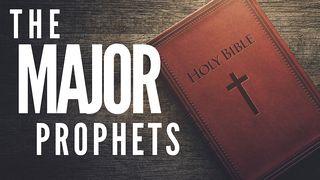Delve Into The ProphetsSample

DAY 11 – ZEPHANIAH
King Hezekiah of Judah was delivered from a deadly illness and from an Assyrian invasion because he trusted in God. But his son Manasseh returned to a policy of appeasing the Assyrian Empire by paying tribute money and promoting Assyrian-style religious practices throughout the kingdom. Manasseh’s reign of fifty-five years coincided with the height of Assyria’s power and influence. It was also the time of greatest corruption, injustice, and paganism in Judah’s history. Manasseh was succeeded by his son Amon, who continued his policies. But Amon was assassinated after only two years, and his young son Josiah succeeded him.
The Assyrian Empire had begun to crumble by this time. Ashurbanipal, its last strong king, died around 627 BC, and its decline accelerated. Josiah was then just old enough to start ruling effectively in his own right. He seized the opportunity and reasserted Judah’s independence and traditional faith. He did this, for one thing, because a member of his court stood up and warned, in God’s name, that the ways of his father and grandfather had brought his kingdom to the brink of destruction. the person who offered this warning was the prophet Zephaniah.
In the prologue to the book of his prophecies, Zephaniah is described as the great-great-grandson of a man named Hezekiah. This probably refers to the great reforming king of Judah. No other prophet’s ancestry is traced back four generations, so this prologue is likely intended to associate Zephaniah with the reforming zeal of his ancestor. Zephaniah appears to have been of royal blood, since his oracles show he was familiar with particular districts in Jerusalem and with specific activities in the capital, as a member of the royal court would have been. But unlike other members of the court who were saying, “The Lord will do nothing, either good or bad,” Zephaniah wasn’t complacent about the future. Instead, he warned that the “day of the Lord” was approaching and that God would soon judge the nations, including both Judah and the formerly invincible Assyria. Zephaniah’s warning seems to have helped inspire national and religious renewal under King Josiah.
The collection of Zephaniah’s prophecies has three main parts. The first is a description of the day of the Lord that will come against Judah and Jerusalem. The next section begins with a call for national repentance and then includes oracles of destruction against the Philistines, Moabites, Ethiopians (Cushites), Assyrians, and Jerusalem itself. But in the final section, Zephaniah promises, as Isaiah had, that God will “restore the fortunes” of a remnant from Judah and give them “honor and praise among all the peoples of the earth.” As a result, all the nations will “call on the name of the Lord and serve him shoulder to shoulder.”
PRAYER: I will be glad and rejoice in You, O Lord. You are the Mighty Warrior who saves.
Scripture
About this Plan

The Old Testament of the Bible is broken into three major sections, the second of which is known as the Prophets. If you didn’t know that, imagine all of the other interesting things you’ll learn in this reading plan as you explore the purpose, context, and background of this fascinating and unique part of God’s Word.
More
We would like to thank Biblica for providing this plan. For more information, please visit: http://www.biblica.com
Related Plans

The Major Prophets

Be Fruitful

Removing the Mask: Finding Freedom in Christ

Bible Stories to Deepen Your Friendships

Music, Movies & God - Film + Faith

Rest in the Wrestle

7 Days to Fall in Love With Jesus – Jean-Luc Trachsel

Kingdom Business: Masterclass Mini Sessions

More Than Conquerors: 10 Days in Romans 8
